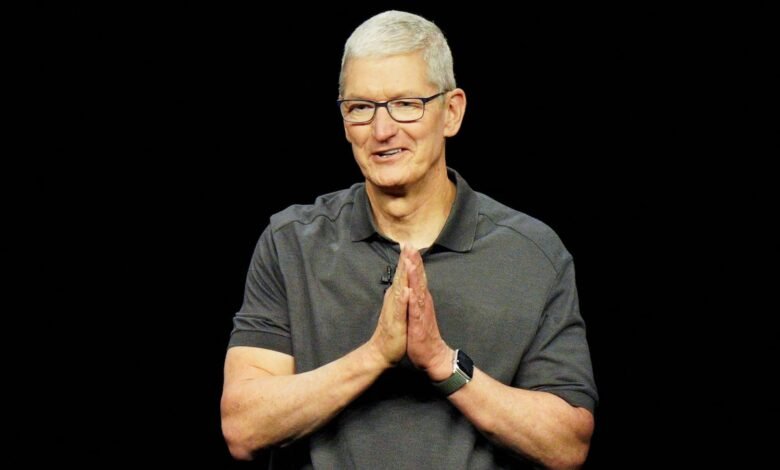Apple enters the generative AI race | Technology

Following this week’s announcements about new generative artificial intelligence projects at OpenAI and Google, all eyes in the industry have turned to Apple. Tim Cook, CEO of the North American company, has just announced that the company will soon disclose its next steps in the new field of open AI, which recently exploded with the introduction of ChatGPT. This will happen on June 10th, at the opening of the annual Worldwide Developers Conference, when the news of iOS 18, the iPhone’s latest operating system, will be announced. Amid a general lack of details, several rumors have emerged in recent weeks about possible directions in which the tech giant could move.
Analysts seem to agree that Apple’s entry into the generative AI race will not be aimed at directly competing with OpenAI and Google, but rather, that the iPhone maker could break the current link between the two by choosing a them to work with your chatbots and other AI services. According to the latest leaks, Apple could be about to sign a deal with ChatGPT to integrate it into the iPhone: although the same sources note that negotiations with Google are still ongoing regarding the use of its Gemini technology. For both competitors, having this privileged access to more than a billion iPhone users would be a fundamental objective in their fierce rivalry.
Since the launch of the first iPhone in 2007, Google has paid Apple a considerable amount — $20 billion in 2022 alone — to have its search engine as the default on phones. While it remains to be seen whether Apple will opt for OpenAI or Google, and to what extent it will integrate AI capabilities, key analysts of the company’s policy believe it will lean toward a different type of contract than the search engine.
In other words, instead of setting the ChatGPT or Gemini chatbots as default on the iPhone, the agreement may involve using their technology. According to BloombergMark Gurman from: “The two companies are in active negotiations to allow Apple to license Gemini, Google’s suite of generative AI models, to power some new features coming to iPhone software this year.” In your daily newsletter Strategy, Ben Thompson writes that he thinks Google has a better infrastructure compared to OpenAI when it comes to being able to manage the avalanche of traffic and data processing that iOS integration would require. Meanwhile, John Gruber, on his technology-focused blog Bold fireballstates that: “I could also see Apple negotiating deals to use multiple AI providers behind the scenes, treating them as white-label vendors while presenting the features to users under the Siri brand.”
Many of the expectations surrounding Apple’s next moves center on what could be a dramatic overhaul of its Siri voice assistant to make it truly intelligent. Since Siri’s debut in 2011, the day before Steve Jobs’ death, it has seen few major updates, and while it can handle simple tasks like calling a contact in your phonebook, its voice recognition system is still resistant to other requests like play a particular song or album. Google’s assistant and Amazon’s Alexa overtook Siri years ago and are considered more efficient and intelligent.
The fall of Siri
The arrival of ChatGPT in 2022, with its far superior ability to listen, respond and even chat with users, has made Apple’s decline in relation to the competition when it comes to voice-activated assistants even more evident. And this week’s OpenAI demo of its new voice conversation mode – reminiscent of the film Her in that it’s able to tell a story about any topic requested, give it the user’s favorite kind of dramatic flair, and present it in multiple languages - it sent Siri straight to the box of forgotten toys.
If Apple chooses to use ChatGPT or Gemini when it comes to talking directly to iPhone users and responding to their requests, that would be the end of Siri. And Apple would lose considerable control over privacy, which has become one of its big talking points in recent years. Faced with the general feeling that Apple is being left behind in the field of artificial intelligence, Cook stated during a recent quarterly presentation: “We believe we have advantages that will differentiate us in this new era, including Apple’s unique combination of hardware , integrated software and software. and service integration, Apple’s innovative silicon with our industry-leading neural engines, and our unwavering focus on privacy that underpins everything we create.”
According to John Gruber, who has a long history of accurately predicting Apple’s new announcements, “Apple’s own efforts in language modeling [which are driven by generative AI] appear to be aimed at processing on your own device”, leveraging the capabilities of their own processors and maintaining full control over privacy, compared to services like ChatGPT that utilize the enormous processing capabilities of cloud server farms. Apple may choose to create relatively simple AI engines for iPhones with its iOS 18 software, which will be released in September. They would manage sensitive information, such as summarizing an audio message or writing a reply to an email, in line with what Samsung has already incorporated into its latest cell phones.
Apple’s privacy and its own chips
Compared to the competition, Apple has a distinct advantage in that it manufactures its own processors for its phones, tablets and computers. Last year surprised the technology industry with how quickly it evolved: in just six months, the company went from launching the M3 processor for its MacBook Pro to debuting the new M4 generation for the new iPad Pro, which has just been launched. for sale. Since 2017, Apple has included in its processors a neural core dedicated exclusively to executing artificial intelligence tasks on its devices; The latest leaks suggest that the tech giant is preparing these chips to be used in its own cloud servers.
“We remain very optimistic about our opportunity in generative AI. We are making significant investments and look forward to sharing some very exciting things with our customers soon,” Cook added in his recent keynote address to analysts and investors. Until the June 10 presentation, with which Apple will begin its annual meeting with app developers for its devices, the company will not disclose its plans publicly. And beyond the leaks, it won’t be possible to deduce many concrete details from the AI business acquisitions the company has made over the past year, or from the scientific papers on language models it has published. None of them were considered very relevant by experts.
The only thing Apple has let slip, although this is far from a big revelation, is that it wants to make a big entry into the new field. “We’re putting a lot of time and effort into artificial intelligence,” Cook told his investors in February. Since then, its marketing team has strived to emphasize its devices’ capabilities in this area, making hard-to-substantiate claims like “customers love the incredible AI performance of the latest MacBook Air and MacBook Pro models.”
While we wait for the real details on how Apple will make its promised entry into the generative AI race, the company appears to have the resources needed for a significant launch into the field following the cancellation of its multibillion-dollar project. to create a self-driving car and the recent completion of its first mixed reality glasses, the Vision Pro. AI is a marathon, not a sprint, and we are still in its early phases with the new ChatGPT voice assistant and the recently introduced update of the Google AI search engine – but these projects indicate exactly what’s at stake when it comes to creating a new way of interacting with our computers, cell phones and tablets.
Sign up for our weekly newsletter for more English news coverage from EL PAÍS USA Edition




